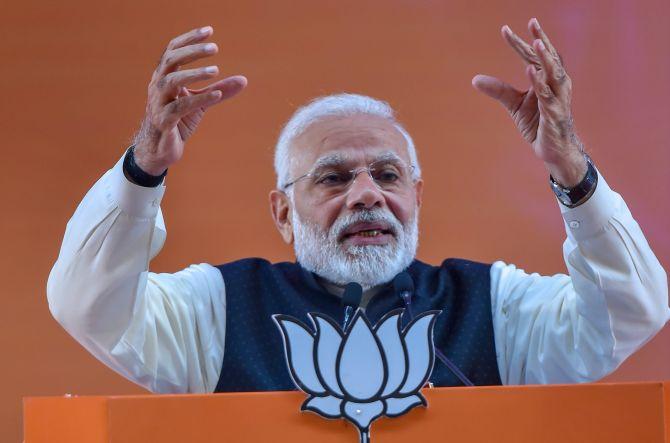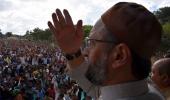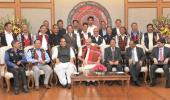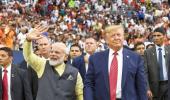It is a repeat of what the nation witnessed for most parts between the LS polls of 2014 and 2019, when the stars of Prime Minister Narendra Modi were on the ascendant as far as national politics went -- without as much electoral benefit for the BJP, says N Sathiya Moorthy.

If there is any lesson for the nation’s polity in the aftermath of the twin assembly elections in Maharashtra and Haryana, it is mostly for the ruling BJP at the Centre -- and none else, mostly.
Coupled with 26 of 57 by-poll tallies for the party and allies, spread across 17 states, along with lower vote shares since the Lok Sabha poll sweep only months ago, it is becoming increasingly clear that ‘Modi magic’ works, but only for himself and not necessarily for the party that is identified with him.
From such a construct arises the finding that it is ‘Modi vs BJP still’ in national politics. It is a repeat of what the nation witnessed for most parts between the LS polls of 2014 and 2019, when the stars of Prime Minister Narendra Modi were on the ascendant as far as national politics went -- without as much collateral electoral benefits for the party, be it in state assembly polls or even LS by-elections through the five-year period.
At the time, barring the UP assembly polls, where caste equations played a greater role than the ‘joint’ Opposition was ready to concede, the BJP and/or its allies lost more elections than the rest. The BJP could only scrape through in Modi-Shah’s native Gujarat, where they had do a lot more work than what party CM Adityanath had to do in UP, to retain power.
Considering that the Congress party, which is the main Opposition in Maharashtra and Haryana, is yet to get over the shock of the LS poll humiliation, the twin assembly polls are an expression of the voters’ angst against the performance of the incumbent BJP governments in the two states.
It is so with regard to most assembly and LS bypolls, where the combined campaign of Modi and his party president and Union home minister, Amit Shah, failed to return the magic of the LS polls one more time.
Translated, neither their ‘K-Talk’ centred on the abrogation of Article 370, or the international opprobrium against Pakistan, which they claimed was also their work, nor the poll eve army raids on terror camps in PoK proved as effective as the ‘surgical strikes’ or Balakot, as they might have anticipated.
There is a danger in this for the BJP, too. Leave aside the Indian voter’s discretion in identifying issues and concerns between leaders and elections, and putting his priorities over his own perceptions of national priorities and those of political parties and their leadership, it could well be a message to the duo at the Centre that they are now under the scanner, too.
Then, this election like that of the pre-2019 assembly polls and LS by-elections, may have also indicated a chasm between the leadership and the ground level and differing perception of the same issues and concerns.
Nothing explains this better than Modi’s personal attacks on Maratha veteran Sharad Pawar who, at 80, was forced to defend his fort, possibly more out of compulsion than out of choice. By teasing Pawar and asking why he was ‘afraid’ of contesting the LS polls, and also declaring him as aiding terrorists (of the D Company), Modi unwittingly may have hurt Maratha and larger Maharashtra ‘sentiments’.
If it brings back memories of Rajiv Gandhi hurting the inherent ‘Telugu pride’ when he chided then Congress chief minister T Anjaiah of unified Andhra Pradesh, the BJP-Shiv Sena combine may have only Modi to blame for the same.
Then of course, there was this internal squabble in which the two Maharashtra allies were fighting their own post-poll squabbles even pre-poll, as if the election was already theirs and they would not face a stiff Opposition in the state assembly, leave aside the possibility of handing over the gaddi to them, instead.
This meant that the BJP and the Shiv Sena were undermining each other from the word ‘go’, from seat-sharing to constituency-choosing. The BJP hoped to form a government without over-dependency on the Sena and the latter would have none of it. Instead, the Sena worked possibly over-time to ensure greater dependency for the BJP on them, to form a post-poll government, but on the former’s terms.
This much has become clear from the post-poll Sena statements, reminding the BJP of the pre-poll 50:50 agreement, about which neither took the voter into confidence, when it mattered. Now that they are in the driver’s seat, the Sena is seeking to have the cake and eat it too.
It is becoming increasingly clear that the Sena would want to embarrass the BJP as much now as they had mutually harassed each other through the previous five years, while sharing power in the nation’s wealthiest state.
Whatever the formula they now agree upon to form a coalition government, both are going to work under the shadow of mutual threat, without reference to those from the relatively better-scoring NCP-Congress combine.
Often, the democratic assumption is that whenever the political Opposition is weak, fissures appear within the ruling party or combine. It has been true of post-Nehruvian India, when the euphoria of the freedom movement and its identification with the Congress party began fading away after the ‘Chinese aggression’ in particular.
In the current case, however, the BJP alliance partners in Maharashtra seemed to have concluded after the landslide victory in the LS polls that there would be no Opposition anymore, and they could and would end up having to fill up the vacancy. This election may have stalled such thinking in its track.
Yet, it remains to be seen if the BJP leadership wants to learn its lessons. The Congress past, which they are aping without acknowledging, has had enough episodes to remind them that tax raids and court cases would weaken the political Opposition only so far and so much.
N Sathiya Moorthy, veteran journalist and political analyst, is Distinguished Fellow, Observer Research Foundation, Chennai Initiative.











 © 2025
© 2025